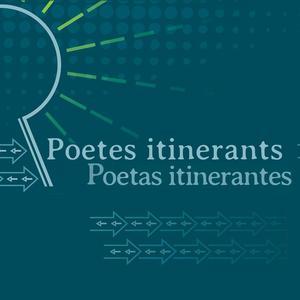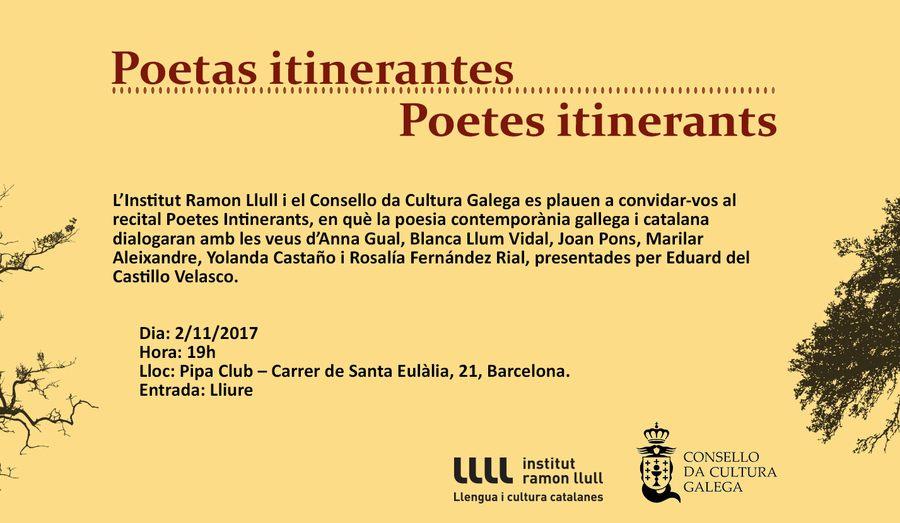Previous editions of Wandering Poets have brought Catalan and Basque poets (2015) and Basque and Galician poets (2016) together in a double-act format, in which they each read poems representative of their entire oeuvre, as well as unpublished works. The participants in these earlier events include Rikardo Arregi, Iñigo Astiz, Itzaro Borda, Mireia Calafell, Jordi Julià, Jordi Llavina, Miren Agur Meabe, Leire Bilbao, Anxo Angueira, Gonzalo Hermo, Dores Tembrás and Manuel Rivas.
This initiative, launched in 2015, is promoted by the Institut Ramon Llull, the Instituto Etxepare and the Consello da Cultura Galega. The aim of the Wandering Poets programme is to forge closer links between cultures using poetry as an ally in the construction of a common space.
Blanca Llum Vidal (Barcelona, 1986) holds a BA in Catalan Philology, an MA in Contemporary Thinking and Classical Theory and also qualified in Social Work. She has taught courses on literature for librarians in the Catalan Public Libraries Network. She has read her work in places all over the Països Catalans, the lands where the Catalan language is spoken, and in Ukraine, Madrid and Galicia. In addition to her own writing, she works as a literary editor and proofreader. She has edited Dues Catalunyes d’Àngel Carmona (Lleonard Muntaner Editor, 2010), the collected poems of Àngel Guimerà (Edicions de 1984, 2010) and Un film (3000 metres) by Víctor Català (Club Editor, 2015). She has published La cabra que hi havia (Documenta Balear, 2009), Nosaltres i tu (Lleonard Muntaner, 2011), Homes i ocells (Club Editor, 2012), Visca! (Documenta Balear, 2012), Punyetera flor (LaBreu Edicions, 2014) and Maripasoula – Crònica d’un viatge a la Guaiana francesa (Tushita Edicions, 2015).
Anna Gual (Vilafranca del Penedès, 1986) was just 22 years old when she published her first book, Implosions (LaBreu Edicions, 2008) after the publisher came across her on the secret blog she had been keeping for the previous two years No caic, em tiro (which won the 2012 Prize for the Best Blog Written in Catalan). In 2012, she published the artist’s book Passa'm-hi els dits (Átem Books, 2012), featuring illustrations by the Austrian illustrator Bianca Tschaikner. A year later, Gual won the Pare Colom Prize for Mediterranean Poetry for her book L’ésser solar (Lleonard Muntaner, 2013). As part of her continuing exploration of the limits of language, Gual released her third anthology of poems, Símbol 47 (LaBreu Edicions, 2015). In 2016, she was awarded two prestigious prizes, the Bernat Vidal i Tomàs Prize for her book Molsa (AdiA Edicions, 2016) and the Senyoriu Ausiàs March Prize for her book El Tubercle (Editorial 3i4, 2016), the first and second parts of her “Arrel Trinitat” trilogy, which will close with her book Altres semidéus.
Joan Pons (Ferreries, 1960) studied Catalan Philology at the University of Barcelona. He lectures at a number of universities and schools for writers. He contributes to various media outlets. He works in the fields of books for children and teenagers, novels, short stories and poetry. The most prestigious prizes in Catalan literature have been awarded to his works: Homes sols, which won the Enciclopèdia catalana Foundation Prize; Remant cap el sol, the Joaquim Ruyra Prize; Nàufrags, the Joan Ramis i Ramis Prize; El laberint de les girafes, selected by the Catalan Public Libraries Network as one of the best works of the 20th century; Sorra a les sabates, shortlisted for the Salambó Prize and selected by Avui newspaper as one of the best works of 2005; and La casa de gel, awarded the City of Alzira Prize. His most recent work, the anthology of poems L’illa dels arbres vençuts, has been acclaimed by critics and readers alike and is regarded as a landmark in contemporary poetry in Catalan. His books have been translated into English, French, German, Russian, Spanish and now into Galician.
Marilar Aleixandre (Madrid, 1947) is split between her identity as a biologist and as a writer, between her research into reasoning at the University of Santiago de Compostela and literature. This may explain why her poetry is full of wild plants (Desmentindo a primavera, Xerais, 2002, and Abecedario de árbores, AELG/Concello de Santiago de Compostela, 2006) and animals that engage in rebellion (Ovella descarreirada, Xerais, 2014). She has won prizes such as the Esquío for Catálogo de velenos (1998) and the Caixanova-PEN for Mudanzas (2007), a rewriting of Metamorphoses in the voice of the women. In 2016, she published Desescribindo (Apiario), followed in 2017 by a re-edition of three collections of poems, Mudanzas e outros velenos (Galaxia).
Rosalía Fernández Rial (Carballo, 1988) holds a BA in Philology and a PhD in the didactics of the languages and expression of drama, awarded by the University of Santiago de Compostela. She has also trained in the performing arts and music. Above all, however, she has devoted herself to writing since a very early age. She currently teaches language and literature and is involved in various artistic and educational projects of an interdisciplinary nature.
As a poet, she has published En clave de sol (2009), Átonos (2011), Vinte en escena (2012), Un mar de sensacións (2012), Ningún amante sabe conducir (2014), Contra-acción (2016), and Sacar a bailar (2016), titles that have metamorphosed into performances and musical presentations. In addition, Fernández Rial is a member of the steering committee of the AELG (Association of Writers in the Galician Language) and of the editorial board of the Revista Galega de Educación.
Yolanda Castaño (Santiago de Compostela, 1977) holds a BA in Philology and pursued audio-visual studies in La Coruña. She works as a cultural activist and since 2009 has directed a number of projects involving Galician and international poets: the monthly POETAS DI(N)VERSOS readings in La Coruña (which won the 2014 Galicia Critics Prize for the best cultural initiative), the PONTEPOÉTICA poetry festival in Pontevedra and the Con barqueira e remador International Poetry Translation Workshop in the isle of San Simón (in the Vigo Estuary). In addition, she offers literary workshops, readings, video poetry and other presentations of her work in Spain and across Europe and the Americas, as well as Tunisia, Cape Verde, India, China and Japan. Her work has been translated into 25 languages.








